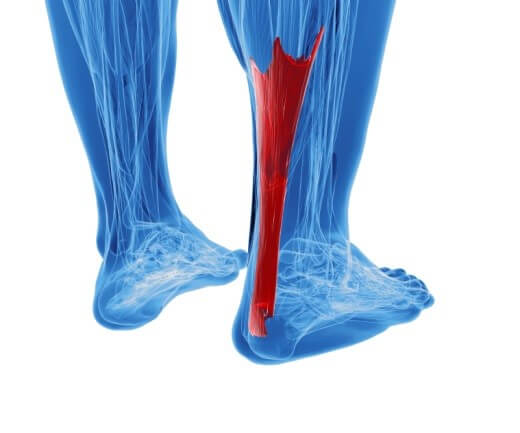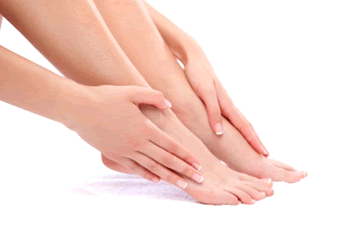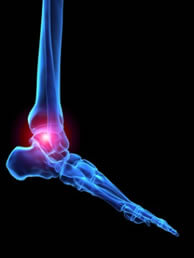Items filtered by date: December 2016
Achilles Tendonitis One of Many Foot and Ankle Injuries
 Known as the thick tendon that connects your calf muscles to your heel bone, the Achilles tendon allows you to do everyday activities such as walking and running. Insertional Achilles tendonitis is a condition of the Achilles tendon in which pain is experienced at the heel, and which can become chronic if left untreated. Non-insertional Achilles tendonitis can be described as a microscopic tearing of the fibers in the tendon. If the problem becomes chronic, a bone spur can eventually develop as the tendon thickens. If severe, the condition may require surgery.
Known as the thick tendon that connects your calf muscles to your heel bone, the Achilles tendon allows you to do everyday activities such as walking and running. Insertional Achilles tendonitis is a condition of the Achilles tendon in which pain is experienced at the heel, and which can become chronic if left untreated. Non-insertional Achilles tendonitis can be described as a microscopic tearing of the fibers in the tendon. If the problem becomes chronic, a bone spur can eventually develop as the tendon thickens. If severe, the condition may require surgery.
Achilles tendon injuries need immediate attention to avoid future complications. If you have any concerns, contact one of our podiatrists from Carolina Foot & Ankle Specialists. Our doctors will attend to all of your foot and ankle needs.
What is the Achilles Tendon?
The Achilles tendon is a tendon that connects the lower leg muscles and calf to the heel of the foot. It is the strongest tendon in the human body and is essential for making movement possible. Because this tendon is such an integral part of the body, any injuries to it can cause severe difficulties and should immediately be presented to a doctor.
What are the symptoms of an Achilles Tendon Injury?
There are various types of injuries that can affect the Achilles tendon. The two most common are Achilles tendinitis and ruptures of the tendon.
Achilles Tendinitis Symptoms
- Inflammation
- Dull to Severe Pain
- Increased blood flow to the tendon
- Thickening of the tendon
Rupture Symptoms
- Extreme pain and swelling in the foot
- Total immobility
Treatment and Prevention
Achilles tendon injuries are diagnosed by a thorough physical evaluation, which can include an MRI. Treatment involves rest, physical therapy, and in some cases, surgery. However, various preventative measures can be taken to avoid these injuries, such as:
- Thorough stretching of the tendon before and after exercise
- Strengthening exercises like calf raises, squats, leg curls, leg extensions, leg raises, lunges, and leg presses
If you have any questions please feel free to contact one of our offices located in Huntersville, Mooresville and Mountain Island, NC. We offer the newest diagnostic and treatment technologies for all your foot and ankle needs.
How to Tell If You Have Plantar Fasciitis
 If you’re experiencing stiffness and pain in the soles of your feet that typically becomes more prominent during the mornings, you may have plantar fasciitis. Plantar fasciitis can be described as a foot condition that results from overuse of the plantar fascia, the tissue that runs along the soles of your feet. Excessive stress on this area can lead to inflammation. Being overweight, having flat feet or high arches, pregnancy and improper footwear such as flip flops are also factors in the development of plantar fasciitis. Treat your condition by icing your feet, stretching your muscles and having proper rest by avoiding any strenuous activity.
If you’re experiencing stiffness and pain in the soles of your feet that typically becomes more prominent during the mornings, you may have plantar fasciitis. Plantar fasciitis can be described as a foot condition that results from overuse of the plantar fascia, the tissue that runs along the soles of your feet. Excessive stress on this area can lead to inflammation. Being overweight, having flat feet or high arches, pregnancy and improper footwear such as flip flops are also factors in the development of plantar fasciitis. Treat your condition by icing your feet, stretching your muscles and having proper rest by avoiding any strenuous activity.
Plantar fasciitis can be very painful and inconvenient. If you are experiencing heel pain or symptoms of plantar fasciitis, contact one of our podiatrists from Carolina Foot & Ankle Specialists. Our doctors will attend to all of your foot and ankle needs.
What is Plantar Fasciitis?
Plantar fasciitis is the inflammation of the thick band of tissue that runs along the bottom of your foot, known as the plantar fascia, and causes mild to severe heel pain.
What Causes Plantar Fasciitis?
· Excessive running
· Non-supportive shoes
· Overpronation
· Repeated stretching and tearing of the plantar fascia
How Can It Be Treated?
· Conservative measures – anti-inflammatories, ice packs, stretching exercises, physical therapy, orthotic devices
· Shockwave therapy – sound waves are sent to the affected area to facilitate healing and are usually used for chronic cases of plantar fasciitis
· Surgery – usually only used as a last resort when all else fails. The plantar fascia can be surgically detached from the heel
While very treatable, plantar fasciitis is definitely not something that should be ignored. Especially in severe cases, speaking to your doctor right away is highly recommended to avoid complications and severe heel pain. Your podiatrist can work with you to provide the appropriate treatment options tailored to your condition.
If you have any questions please feel free to contact one of our offices located in Huntersville, Mooresville and Mountain Island, NC. We offer the newest diagnostic and treatment technologies for all your foot and ankle needs.
Burning Sensation in the Feet
 If you have symptoms of a burning sensation in your feet, you may have any number of conditions. The sensation of burning in the feet can be either minor or severe, affect people over 50, and occur most frequently during the night. Nerve damage from diabetes, vitamin deficiency or alcoholism, obesity, strain on the feet, overheated feet, eczema or dermatitis, blood disorders, or any other impairment of the feet’s nerves can all lead to the described burning sensation. Seeing your podiatrist is vital to understanding any underlying causes. Make sure that you are wearing properly-fitting shoes as well.
If you have symptoms of a burning sensation in your feet, you may have any number of conditions. The sensation of burning in the feet can be either minor or severe, affect people over 50, and occur most frequently during the night. Nerve damage from diabetes, vitamin deficiency or alcoholism, obesity, strain on the feet, overheated feet, eczema or dermatitis, blood disorders, or any other impairment of the feet’s nerves can all lead to the described burning sensation. Seeing your podiatrist is vital to understanding any underlying causes. Make sure that you are wearing properly-fitting shoes as well.
When dealing with systemic disease of the feet, is extremely important to check the affected areas routinely so that any additional problems are caught quickly. If you have any concerns about your feet and ankles contact one of our podiatrists from Carolina Foot & Ankle Specialists. Our doctors will attend to all of your foot and ankle needs.
Systemic Diseases of the Feet
Systemic diseases affect the whole body, and symptoms usually are displayed in the feet. This condition can make a patient’s ability to walk unbearable. Systemic diseases include gout, diabetes mellitus, neurological disorders, and arthritis.
Gout – is caused by an excess of uric acid in the body. Common symptoms include pain, inflammation, and redness at the metatarsal/phalangeal joint of the base big toe. Gout can be treated by NSAIDs to relieve pain and inflammation, and other drugs that lower the acid levels in the body.
Diabetes mellitus – is an increase in the level of blood sugar that the body cannot counteract with its own insulin. Failure to produce enough insulin is a factor in Diabetes.
Diabetes of the Feet
Diabetic Neuropathy – may lead to damaged nerves and affect the feet through numbness and loss of sensation.
Peripheral Vascular Disease – can restrict the blood flow to the feet, and often times lead to amputation of the feet.
If you have any questions please feel free to contact one of our offices located in Huntersville, Mooresville and Mountain Island, NC. We offer the newest diagnostic and treatment technologies for all your foot and ankle needs.
CDC Releases Report on Arthritis
 Arthritis is a condition that affects not only the hands and wrists, but feet and ankles as well. There are more than 50 million people in the US that are currently diagnosed with arthritis and there are a lot of different opinions on how to effectively treat the disease. Frequently it is difficult to parse through what does work and what doesn’t. Arthritis can be painful, especially when it affects the foot and ankle area. When trying to manage this pain, it is important to be informed on what types of treatments are effective, keeping in mind that some can actually be harmful. The CDC has recently released a report that outlines some good and bad treatments for this chronic ailment.
Arthritis is a condition that affects not only the hands and wrists, but feet and ankles as well. There are more than 50 million people in the US that are currently diagnosed with arthritis and there are a lot of different opinions on how to effectively treat the disease. Frequently it is difficult to parse through what does work and what doesn’t. Arthritis can be painful, especially when it affects the foot and ankle area. When trying to manage this pain, it is important to be informed on what types of treatments are effective, keeping in mind that some can actually be harmful. The CDC has recently released a report that outlines some good and bad treatments for this chronic ailment.
Arthritis can be a difficult condition to live with. If you are seeking treatment, contact one of our podiatrists from Carolina Foot & Ankle Specialists. Our doctors will attend to all of your foot and ankle needs.
Arthritic Foot Care
Arthritis is a joint disorder that involves inflammation of different joints in your body, such as in your feet. Arthritis is often caused by a degenerative joint disease and causes mild to severe pain in all affected areas. On top of this, swelling and stiffness in the affected joints can also be a common symptom of arthritis.
In many cases, wearing ill-fitting shoes can worsen the effects and pain of arthritis. Wearing shoes that have a lower heel and extra room can help your feet feel more comfortable. In cases of rheumatoid arthritis, the arch in your foot may become problematic. Buying shoes with proper arch support that contour to your feet can help immensely.
Alleviating Arthritic Pain
- Exercises that stretch the foot can prevent further pain and injury and increase mobility
- Most of the pain can be alleviated with anti-inflammatory drugs, heat, and topical medications
- Massages can help to temporarily alleviate pain.
It is best to see your doctor for the treatment that is right for your needs and symptoms. Conditions vary, and a podiatrist can help you determine the right method of care for your feet.
If you have any questions please feel free to contact one of our offices located in Huntersville, Mooresville and Mountain Island, NC. We offer the newest diagnostic and treatment technologies for all your foot and ankle needs.
